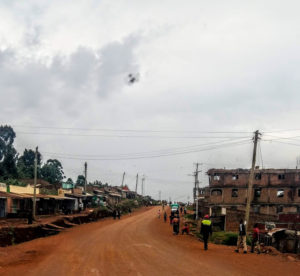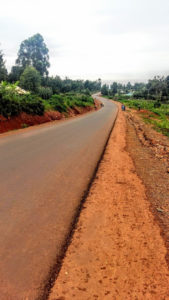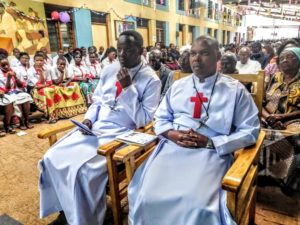 Let us be immediately clear: no evidence of any miracle must be sent to the Congregation of Saints in Rome for the required assessment. However, what we are speaking about could equally be defined as a miracle because it was provided after forty years of insistent demands. Unfortunately, various people who had awaited this ‘miracle’ are no longer alive, they had the time to grow old…and die.
Let us be immediately clear: no evidence of any miracle must be sent to the Congregation of Saints in Rome for the required assessment. However, what we are speaking about could equally be defined as a miracle because it was provided after forty years of insistent demands. Unfortunately, various people who had awaited this ‘miracle’ are no longer alive, they had the time to grow old…and die.
The miracle is the following: after forty years of beseeching, the road that leads to the hospital of Tabaka in the diocese of Kisii (Kenya) has been tarmacked! It is a stretch of only five kilometres and goes from Nyachenge to the village of Tabaka. It is indeed a mountain road which has a steep incline but this was not the problem making it a difficult road to travel down. The problem was another – the rain! When it rained, the road became impassable because of its slippery surface, made up of red earth, which when mixed with water became a great soapy sludge which meant that cars slid all over the place, often ending up of their own accord in one of the drainage ditches on either side of the road. How often did Fr. Mario Cattaneo receive urgent calls to drag an unfortunate car out of a ditch into which it had slithered. He had to take the van from the hospital, arm himself with a rope and set out, whether by day or night, to rescue the poor driver.
I could not believe my eyes, therefore, on Sunday 8 December, when I went with the novices to Tabaka to join two confreres – Charles and Dominic – who on that day were making their perpetual professions. A fine strip of tarmac stretched out in front of us, smooth but steady, which in a few minutes had taken us to the Tabka Mission Hospital. How much suffering that rough road had caused! How many sick people, already suffering because of their state of health, had experienced the martyrdom of being shaken up and down by the swaying of the ambulance or the matatu that went along those five kilometres that never stopped! More than a few women had given birth during that brief journey because of the tossing of the car.
It was July 1976 when the Camillians reached Tabaka to become responsible for the running of the hospital. From early on they had informed the local powers that be 


Brother Fabio Zeni, Fr. Francesco Spagnolo, Fr. Rino Meneghello, Br. Valentino Gastaldello, Fr. Gian Marco dal Bon and Fr. Pietro Cunegatti did not have the good fortune to admire this strip of tarmac which now, in a few minutes, goes from the main road of Kisii-Rongo to the hospital in Tabaka. And yet how many times they went down it, when it was still made of red earth, perhaps after completing the 350 kilometres from Nairobi, bringing medical products or other supplies to be found only in the capital. When you reached Kissi you prayed to the Lord, asking Him to ensure that the rain held off for a little time so that you could get to Tabaka in time before the usual downpour/storm that made the road surface slippery, muddy and impassable, with the terror of sliding to left or right, without stopping…Yes indeed because in Tabaka it does not rain every so often as is often the case in many parts of Africa. In Tabaka it rains almost every day, between two and five in the afternoon, perhaps for only ten minutes, but the rain comes bucketing down, mixed with a strong wind. This is due to the geographical location of Tabaka which is on the top of a hill where hot winds coming from nearby Lake Victoria easily encounter cold winds from the Highlands. Tabaka is 1,500 metres above sea level, at the height of Mount Grappa to be precise.
The reason why we were in Tabaka – let us repeat the point – was the profession of perpetual vows of Charles and Domenico, two Camillians who in February 2020 will be ordained deacons. They completed their theological studies last year in Nairobi and then spent their year of pastoral work doing various activities of ministry with the Delegation of Kenya. Charles took advantage of this to do a course in CPE whereas Dominic enrolled in a course for professional nurses at the College for Nurses of Tabaka Hospital where he lives.



If all of this took place with the old road, who knows with what speed Tabaka will go forward now with the strip of tarmac that connects Tabaka with the rest of Africa!





